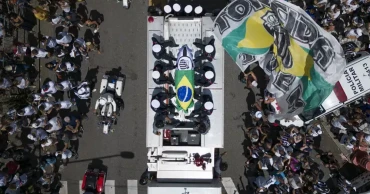Pele
Lionel Messi’s rookie card sells for record $1.5 million, surpassing Pele
A rookie card featuring Argentine football superstar Lionel Messi has been sold for a record-breaking $1.5 million in a private transaction, making it the most valuable soccer card ever sold. This new record surpasses the previous one held by a card of Brazilian legend Pele.
According to Goldin Auctions, the card, a 2004-05 Panini Mega Cracks PSA 10, was sold through Fanatics Collect’s private sales network. This sale tops a similar card that sold for $1.1 million earlier this week in a deal also facilitated by Goldin.
The previous record for a soccer card was set in 2022 when a 1958 Alifabolaget Pele PSA 9 sold privately for $1.33 million, according to Card Ladder.
This latest record is part of a series of high-value sales for this specific Messi rookie card. Just last month, a different PSA 10-graded version of the card sold for $1 million through Fanatics Collect, a global digital sports platform that trades cards and collectibles. Prior to that, another copy sold for $825,000 at Goldin. The record for the card before August was reportedly $336,000, set in June 021.
Messi scores twice in emotional farewell match for Argentina
The sale marks a major milestone for Fanatics Collect's new private sales network, which is designed for high-value transactions of $10,000 or more. According to a source from Fanatics who spoke with ESPN, the network generated roughly $8 million in sales from 30 to 40 transactions during its first full month in August.
Out of the 838 copies of the No. 71 Messi card that PSA has graded, only 20 have received the highest possible grade of Gem-Mint 10, making them extremely rare and valuable. The record-breaking $1.5 million card also includes a special “Mike Baker Authenticated Diamond” certification, which signifies its exceptional condition.
5 months ago
Pele's pain, Rooney's rocket and great escapes: Everton bids farewell to Goodison Park
Goodison Park, the long-time home of Premier League team Everton, has staged more top-tier games than any other stadium in England. It was where Pele was kicked to pieces before losing a World Cup match with Brazil for the only time. It was where eight English league titles were won, and where several nerve-shredding escapes from relegation in the Premier League were completed.
Everton will leave Goodison at the end of this season to move to a new 53,000-seat stadium at nearby Bramley-Moore Dock. Sunday's visit of Southampton marks the final game in the team's home of 133 years and the occasion will be marked by what Everton is calling an “End of an Era” ceremony afterward.
The stadium will continue to operate instead in the women's game, as the new home of Everton Women.
Here is Goodison’s story so far:
Goodison wasn't always Everton's home
Goodison Park has been the home to eight of Everton's nine title-winning campaigns. The first came somewhere you might not expect.
Back on the pitch: PSL resumes after conflict-forced suspension
Everton became a professional club and played its first Football League fixture at Anfield — now the storied home of neighbor Liverpool — from 1884-92. The club's first league title was won there in 1891, with Everton matches watched by crowds of up to 20,000.
But a dispute with Everton's then-chairman, who owned the land, pushed club officials to buy a field just across Stanley Park and build a new stadium — Goodison Park.
It opened in 1892, staged an FA Cup final two years later and, in 1924, hosted an exhibition baseball game between the Chicago White Sox and New York Giants on their world tour.
The architect
Goodison Park is a celebrated example by the greatest architect of soccer’s early years, Archibald Leitch.
The Scottish architect who designed dozens of soccer and rugby venues in the early 20th century started work at Everton with the Goodison Road stand in 1909. The huge construction was popularly compared to an ocean liner called the Mauretania.
The main Bullens Road stand is now 99 years old and still has the signature Leitch feature, crossed trusses on the upper-tier balcony.
What Leitch didn't build was another unique feature of Goodison Park — St. Luke’s Church in one corner of the ground next to the Gwladys Street end that's home to Everton’s noisiest fans.
Pele's World Cup troubles at Goodison
Pelé played in 14 games at four different World Cups from 1958 to 1970 and lost only one: at Goodison.
Brazil was based at Goodison for its group-stage games in 1966 and the two-time defending champion’s superstar was targeted for rough treatment. Pelé scored in an opening 2-0 win over Bulgaria but was too injured to then face Hungary, which won 3-1.
Pelé came back for a decisive game against Eusebio’s Portugal and again was repeatedly fouled. Portugal won 3-1 and Brazil exited with the sad sight of Pelé limping around the Goodison field.
Goodison hosted an epic quarterfinal — North Korea took an early three-goal lead before Eusebio scored four and Portugal won 5-3 — then a semifinal that controversially didn't involve England. FIFA, led by its English president Stanley Rous, switched the England-Portugal game to Wembley and Goodison instead hosted West Germany beating the Soviet Union. Fans in Liverpool were not impressed, calling it an “England fix."
Goodison was “the best stadium in my playing life,” Eusebio said in 2009 on a return visit.
Goodison's greatest games
For many Everton fans, nothing quite tops the atmosphere that was generated in the stadium — often fondly referred to as the “Grand Old Lady” — when their team beat Bayern Munich and Lothar Matthäus 3-1 in the second leg of the European Cup-Winners' Cup semifinals.
The old stadium rocked with relief as much as joy when Everton came from two goals down to beat Wimbledon 3-2 on the final day of the 1993-94 season to stay in the Premier League, and again four years later after a final-round 1-1 draw with Coventry to stay up on goal difference.
A 16-year-old Wayne Rooney announced himself to the world when coming off the bench to score with a last-minute, long-range curler in off the bar to end Arsenal’s 30-game unbeaten league run in October 2002.
And there was the final men's Merseyside derby at Goodison in February. James Tarkowski smashed a shot into the roof of the net in the eighth minute of stoppage time to secure Everton a 2-2 draw with Liverpool.
What's next?
Everton is moving to Bramley-Moore Dock on Liverpool's waterfront to start next season. The new stadium already staged test events, is slated to host a high-profile rugby league match between England and Australia on Nov. 1, and is a host venue for the men’s European Championship in 2028.
The plan was for Goodison Park to be demolished but Everton's new owners — the Friedkin family from Texas — announced this week that the women's team, which plays in the top-flight Super League, will play there from next season, moving from its nearby current home in Walton Hall Park. Goodison's current capacity of nearly 40,000 will likely be reduced.
END/UNB/AP/MA
9 months ago
Neymar breaks Pele's Brazil goal-scoring record in 5-1 win in South American World Cup qualifying
Neymar became the top goal scorer for Brazil's national team after surpassing the total of three-time World Cup winner Pelé on Friday.
The goal that put the 31-year-old Neymar on the top of Brazil's scoring record with 78 came in the 61st minute in a World Cup qualifying match against Bolivia in the Amazon city of Belém.
It was Brazil's fourth goal of the match in a 5-1 win, with the last goal of the game also being scored by Neymar during injury time.
Read : Neymar completes Saudi move to Al Hilal after 6 seasons with Paris Saint-Germain
Neymar's record-breaking goal came after a low cross into the penalty box, which the striker finished with accuracy from close range. He celebrated with a punch in the air, as Pelé usually did.
Earlier, the Al-Hilal striker missed a penalty in the 17th minute, which goalkeeper Billy Viscarra saved.
Neymar's second goal in the match came in similar fashion near the final whistle, with another low cross by Raphinha.
Brazil's soccer confederation considers Pelé as its top goal scorer with 95 goals in 114 matches. FIFA does not count goals the three-time World Cup winner had at national team friendlies against clubs.
Read : Neymar’s publicity representative Robin Miah meets Brazilian envoy in Dhaka
"78 times Neymar," the Brazilian soccer body said on social media after Neymar's record-breaking goal. "Neymar scores the fifth for the Selecao," it said after the striker's second goal against Bolivia.
Pelé's Foundation, however, acknowledged Neymar's achievement.
"Congratulations, Neymar Jr, for surpassing the King in goals for the Brazilian National Team in official FIFA matches," it said on social media. "Surely Pelé is applauding you today!"
Pelé died from cancer on Dec. 29 in Sao Paulo at the age of 82.
Striker Rodrygo, who also scored two goals against Bolivia, said he's still very much a Neymar fan.
"Neymar is very much a hero of mine," Rodrygo said. "This will be in my memory, this was a very special day."
Read : Messi scores from a free kick to give Argentina 1-0 win in South American World Cup qualifying
Neymar's most-recent match for Brazil before the victory over Bolivia was the World Cup quarterfinal loss last year to Croatia. He left Qatar with doubts about his future in the national team and did not play the Selecao's first three games this year.
New Brazil coach Fernando Diniz said Neymar came to play for Brazil "to score goals, break records, show that he is very much willing to live this (the national team.)"
"He is a great hero," Diniz said. "People have to recognize it and accept it. He doesn't do anything to get this adoration he gets from the crowd, it is because of the natural talent he has."
2 years ago
Pelé buried at cemetery in Brazilian city he made famous
Brazil said a final farewell to Pelé on Tuesday (January 3, 2023), burying the legend who unified the bitterly divided country.
Newly inaugurated President Luiz Inácio Lula da Silva paid his respects at Vila Belmiro, the stadium where Pelé played for most of his career.
Pelé died last week at age 82 and was laid to rest in Santos, the city where he became famous after moving there at age 15 to play for Santos FC. The funeral Mass was held at the team’s Vila Belmiro stadium before his black casket was driven through the streets of the of Santos in a firetruck.
READ: Brazilians mourn Pelé at the stadium where he got his start
It was taken into the cemetery as bands played the team’s official song and a Roman Catholic hymn. Before the golden-wrapped casket arrived, attendees sang samba songs that Pelé liked.
Some Brazilian soccer legends weren’t there.
“Where’s Ronaldo Nazario? Where’s Kaká, where’s Neymar?” asked Claudionor Alves, 67, who works at a bakery next to the stadium. “Do they think they will be remembered like Pelé will? These guys didn’t want to stop their vacations, that’s the problem.”
READ: 'Greatest of all time': Pelé as described by his peers
Geovana Sarmento, 17, waited in a three-hour line to view Pelé’s body as it lay in repose. She came with her father, who was wearing a Brazil shirt with Pelé’s name.
“I am not a Santos fan, neither is my father. But this guy invented Brazil’s national team. He made Santos stronger, he made it big, how could you not respect him? He is one of the greatest people ever, we needed to honor him,” she said.
Caio Zalke, 35, an engineer, wore a Brazil shirt as he waited in the line.
READ: Pelé remembered for transcending football around world
“Pelé is the most important Brazilian of all time. He made the sport important for Brazil and he made Brazil important for the world,” Zalke said.
Pelé in the 1960s and 1970s was perhaps the world’s most famous athlete. He met presidents and queens, and a civil war in Nigeria was put on hold so people could watch him play. Many Brazilians credit Pelé with putting the country on the world stage for the first time.
Rows of shirts with Pelé’s No. 10 were placed behind one of the stadium’s goals, waving in the city’s summer winds. A section of the stands filled up with bouquets of flowers placed by mourners and sent by clubs and star players — Neymar and Ronaldo among them — from around the world as loudspeakers played the song “Eu sou Pelé” (“I am Pelé”) recorded by him.
Read more: Brazil mourns Pelé, who made every part of the country proud
The crowd was mostly local, although some came from far away, and many mourners were too young ever to have seen Pelé play. The mood was light, as people filtered out of the stadium to local bars, wearing Santos FC and Brazil shirts.
Claudio Carrança, 32, a salesman, said: “I never saw him play, but loving Pelé is a tradition that goes from father to son in Santos. I learned his history, saw his goals, and I see how Santos FC is important because he is important. I know some Santos fans have children supporting other teams. But that’s just because they never saw Pelé in action. If they had, they would feel this gratitude I feel now.”
Among those at the stadium was Pelé’s best friend Manoel Maria, also a former Santos player.
Read More: Pele: The Greatest Football Legend of All Time
“If I had all the wealth in the world I would never be able to repay what this man did for me and my family,” Maria said. “He was as great a man as he was as a player — the best of all time. His legacy will outlive us all. And that can be seen in this long line with people of all ages here.”
FIFA President Gianni Infantino told journalists that every country should name a stadium after Pelé.
“I am here with a lot of emotion, sadness, but also with a smile because he gave us so many smiles,” Infantino said. “As FIFA, we will pay a tribute to the ‘King’ and we ask the whole world to observe a minute of silence.”
Read More: As 'The King,' Pelé enchanted fans and dazzled opponents
Another fan and friend in line was Brazilian Supreme Court Justice Gilmar Mendes.
“It is a very sad moment, but we are now seeing the real meaning of this legendary player to our country,” Mendes told journalists. “My office has shirts signed by Pelé, a picture of him as a goalkeeper, also signed by him. DVDs, photos, a big collection of him.”
Pelé had undergone treatment for colon cancer since 2021. The medical center where he had been hospitalized said he died of multiple organ failure as a result of the cancer.
Read More: Pelé, Brazil’s mighty king of ‘beautiful game,’ has died
Pelé led Brazil to World Cup titles in 1958, 1962 and 1970 and remains one of the team’s all-time leading scorers with 77 goals. Neymar tied Pelé’s record during this year’s World Cup in Qatar.
3 years ago
Brazil prepares to bury Pelé in city he made football mecca
Forty-five years after Pelé played his last game, it's hard to imagine modern soccer, or Brazil, without him.
Geovana Sarmento, 17, waited in the three-hour line to view his body as it lay in repose at the stadium where he played for most of his career. She came with her father, who was wearing a Brazil shirt with Pelé’s name.
“I am not a Santos fan, neither is my father. But this guy invented Brazil’s national team. He made Santos stronger, he made it big, how could you not respect him? He is one of the greatest people ever, we needed to honor him,” she said.
Pelé will be buried Tuesday in the city where he grew up, became famous, and helped make into a global capital of soccer. A Catholic Mass will be celebrated at the Vila Belmiro stadium before his casket is ushered through the streets of Santos to a nearby cemetery.
Brazil’s newly inaugurated President Luiz Inácio Lula da Silva, who was sworn in for a third term Sunday after a comeback victory, paid his respects at Vila Belmiro.
Read more: Brazilians mourn Pelé at the stadium where he got his start
The soccer great died Thursday at age 82 after a battle with cancer. He was the only player ever to win three World Cups.
Thousands of mourners, including high school students and supreme court justices, filed Monday past the body of Pelé on the century-old field where he made his hometown team one of Brazil’s best. Pelé’s coffin, draped in the flags of Brazil and the Santos FC football club, was placed on the midfield area of Vila Belmiro.
Lula arrived at 9 a.m. and took part in a Catholic Mass as fans continued to walk past the coffin, and expressed his condolences to Pelé’s widow, Marcia Aoki, holding her head between his hands. He left 30 minutes later.
The storied 16,000-seat stadium was surrounded by mourning fans, and covered with Pelé-themed decorations inside. Fans coming out of the stadium said they’d waited three hours in line, standing under a blazing sun.
Caio Zalke, 35, an engineer, wore a Brazil shirt as he waited in line. “Pelé is the most important Brazilian of all time. He made soccer important for Brazil and he made Brazil important for the world,” he said.
In the 1960s and 70s, Pelé was perhaps the world’s most famous athlete. He met presidents and queens, and in Nigeria a civil war was put on hold to watch him play. Many Brazilians credit him with putting the country on the world stage for the first time.
Rows of shirts with Pelé’s number 10 were placed behind one of the goals, waving in the city’s summer winds. A section of the stands was filling up with bouquets of flowers placed by mourners and sent by clubs and star players — Neymar and Ronaldo among them — from around the world as loudspeakers played a song named “Eu sou Pelé” (“I am Pelé”) that was recorded by the Brazilian himself.
Read more: 'Greatest of all time': Pelé as described by his peers
The crowd was mostly local, although some came from far away. Many mourners were too young ever to have seen Pelé play. The mood was light, as people filtered out of the stadium to local bars, wearing Santos FC and Brazil shirts.
Claudio Carrança, 32, a salesman, said: “I never saw him play, but loving Pelé is a tradition that goes from father to son in Santos. I learned his history, saw his goals, and I see how Santos FC is important because he is important. I know some Santos fans have children supporting other teams. But that’s just because they never saw Pelé in action. If they had, they would feel this gratitude I feel now.”
Among those at the stadium was Pelé’s best friend Manoel Maria, also a former Santos player.
“If I had all the wealth in the world I would never be able to repay what this man did for me and my family," Maria said. "He was as great a man as he was as a player; the best of all time. His legacy will outlive us all. And that can be seen in this long line with people of all ages here.”
FIFA President Gianni Infantino told journalists that every country should name a stadium after Pelé.
“I am here with a lot of emotion, sadness, but also with a smile because he gave us so many smiles,” Infantino said. “As FIFA, we will pay a tribute to the ‘King’ and we ask the whole world to observe a minute of silence.”
Another fan and friend in line was Brazilian Supreme Court Justice Gilmar Mendes.
“It is a very sad moment, but we are now seeing the real meaning of this legendary player to our country,” Mendes told journalists. “My office has shirts signed by Pelé, a picture of him as a goalkeeper, also signed by him. DVDs, photos, a big collection of him.”
Pelé had undergone treatment for colon cancer since 2021. The medical center where he had been hospitalized said he died of multiple organ failure as a result of the cancer.
Pelé led Brazil to World Cup titles in 1958, 1962 and 1970 and remains one of the team’s all-time leading scorers with 77 goals. Neymar tied Pelé’s record during this year’s World Cup in Qatar.
3 years ago
Brazilians mourn Pelé at the stadium where he got his start
Thousands of mourners, including high school students and supreme court justices, began filing past the body of Pelé on Monday on the century-old field where he made his hometown team one of Brazil’s best.
The soccer great died on Thursday after a battle with cancer. He was the only player ever to win three World Cups, and he was 82.
Pelé’s coffin, draped in the flags of Brazil and the Santos FC football club, was placed on the midfield area of Vila Belmiro, the stadium outside Sao Paulo that was his home for most of his career. A Catholic Mass will be celebrated there Tuesday morning before his burial at a nearby cemetery. Brazil’s newly inaugurated President Luiz Inácio Lula da Silva will come to Vila Belmiro shortly before Pelé’s coffin is removed from the stadium.
The storied 16,000-seat stadium was surrounded by mourners, and covered with Pelé-themed decorations. Fans coming out of the stadium said they’d waited three hours in line, standing under a blazing sun.
Read: 'Greatest of all time': Pelé as described by his peers
Forty-five years after Pelé played his last game, he’s still a central part of Brazil’s national story.
Geovana Sarmento, 17, came with her father, who was wearing a Brazil shirt with Pelé’s name.
“I am not a Santos fan, neither is my father. But this guy invented Brazil’s national team. He made Santos stronger, he made it big, how could you not respect him? He is one of the greatest people ever, we needed to honor him,” she said.
In the 1960s and 70s, Pelé was perhaps the world’s most famous athlete. He met presidents and queens, and in Nigeria a civil war was put on hold to watch him play. Many Brazilians credit him with putting the country on the world stage.
Read: Pelé remembered for transcending football around world
Caio Zalke, 35, an engineer, also wore a Brazil shirt as he waited in line. “Pelé is the most important Brazilian of all time. He made soccer important for Brazil and he made Brazil important for the world,” he said.
Rows of shirts with Pelé’s number 10 were placed behind one of the goals, waving in the city’s summer winds. A section of the stands was filling up with bouquets of flowers placed by mourners and sent by clubs and star players — Neymar and Ronaldo among them — from around the world as loudspeakers played a song named “Eu sou Pelé” (“I am Pelé”) that was recorded by the Brazilian himself.
Claudio Carrança, 32, a salesman, said: “I never saw him play, but loving Pelé is a tradition that goes from father to son in Santos. I learned his history, saw his goals, and I see how Santos FC is important because he is important. I know some Santos fans have children supporting other teams. But that’s just because they never saw Pelé in action. If they had, they would feel this gratitude I feel now.”
Santos FC said that more than 1,100 journalists from 23 countries were at the funeral. Dignitaries and friends of Pelé in attendance spoke at the funeral.
Read More: Brazil mourns Pelé, who made every part of the country proud
Among them was Pelé’s best friend Manoel Maria, who is also a former Santos player. “If I had all the wealth in the world I would never be able to repay what this man did for me and my family. He was as great a man as he was as a player; the best of all time. His legacy will outlive us all. And that can be seen in this long line with people of all ages here.”
FIFA President Gianni Infantino told journalists that every country should name a stadium after Pelé.
“I am here with a lot of emotion, sadness, but also with a smile because he gave us so many smiles,” Infantino said. “As FIFA, we will pay a tribute to the ‘King’ and we ask the whole world to observe a minute of silence.”
Another fan and friend in line was Brazilian Supreme Court Justice Gilmar Mendes.
Read More: 'Greatest of all time': Pelé as described by his peers
“It is a very sad moment, but we are now seeing the real meaning of this legendary player to our country,” Mendes told journalists. “My office has shirts signed by Pelé, a picture of him as a goalkeeper, also signed by him. DVDs, photos, a big collection of him.”
Mendes also said Pelé was a humble man despite his global fame, and that he deserves every tribute.
The casket will be ushered through the streets of Santos before his burial Tuesday.
Pelé had undergone treatment for colon cancer since 2021. The medical center where he had been hospitalized said he died of multiple organ failure as a result of the cancer.
The soccer star led Brazil to World Cup titles in 1958, 1962 and 1970, and remains one of the team’s all-time leading scorers with 77 goals. Neymar tied Pelé’s record during this year’s World Cup in Qatar.
Read More: As 'The King,' Pelé enchanted fans and dazzled opponents
3 years ago
Brazil mourns Pelé, who made every part of the country proud
With Pelé’s death, Brazilians have lost a piece of their hearts.
On Rio de Janeiro’s Ipanema beach, the news broke when Paulo Vinicius was playing soccer with his 9-year-old nephew.
“Pelé represents the best of Brazil: its people, its working class,” said Vinicius, 38, a physical-education instructor. “Pelé gives a sense of identity to the Brazilian people.”
In the coastal city of Santos, where Pelé made his name, Nicolas Oliveira, 18, was outside the stadium along with roughly 200 others. Oliveira said even replays of Pelé’s sensational playing make him swell with emotion.
Read: Pele: The Greatest Football Legend of All Time
“Pelé is a Black man from the interior of Minas Gerais state,” Oliveira said. “I’m here because of what he did, for the soccer he played, for the soccer he improved and for the future players he helped mold and inspire.”
Everton Luz, a 41-year-old lawyer, was crying outside the hospital with a Santos club flag wrapped around him. He had come directly from work to pay tribute to the player whose performances had electrified his own dad, and prompted decades of stories.
Luz recounts those stories to his own two children, and shows them videos of the idol. He recalled seeing Pelé in person once, watching a game at a stadium.
“We managed to get close to his box, and he waved goodbye,” Luz said. “He was an example of the Brazilian, of what we could become.”
3 years ago
'Greatest of all time': Pelé as described by his peers
Pele has been praised over the decades by everyone from world leaders to artists. Here are superlatives from over the years about Pele, who died Thursday in Brazil at age 82:
___
“To watch him play was to watch the delight of a child combined with the extraordinary grace of a man in full.” — Nelson Mandela.
___
“I told myself before the game, he’s made of skin and bones just like everyone else — but I was wrong.” — Italy's Tarcisio Burgnich, after playing against Pele in the 1970 World Cup Final.
___
“Pelé was one of the few who contradicted my theory: Instead of 15 minutes of fame, he will have 15 centuries.” — Andy Warhol.
Read more: Pelé remembered for transcending football around world
___
“I sometimes feel as though football was invented for this magical player.” — Sir Bobby Charlton, retired England great who won 1966 World Cup and Ballon d’Or in same year.
___
“Pelé was the only footballer who surpassed the boundaries of logic.” — Johan Cruyff, the late Dutch star and standout manager who won the Ballon d’Or three times.
___
“He is the most complete player I ever saw.” — Retired German great Franz Beckenbauer.
___
“If you take the qualities of Cristiano Ronaldo and (Lionel) Messi, put them together, then you’d have a player to compare to Pelé!” — Retired Brazil forward Tostao.
___
“The best player ever? Pelé. (Lionel) Messi and Cristiano Ronaldo are both great players with specific qualities, but Pelé was better.” — Alfredo Di Stefano, the late Argentine star for Real Madrid.
___
“His great secret was improvisation. Those things he did were in one moment. He had an extraordinary perception of the game.” — Brazil defender Carlos Alberto Torres.
___
“This debate about the player of the century is absurd. There’s only one possible answer: Pelé. He’s the greatest player of all time, and by some distance, I might add.” — Retired Brazil star Zico.
___
“The greatest player in history was Di Stefano. I refuse to classify Pelé as a player. He was above that.” — Hungary star Ferenc Puskas.
___
“We went up together to head a ball. I was taller, had a better impulse. When I came back down, I looked up in astonishment. Pelé was still there, in the air, heading that ball. It was like he could stay suspended for as long as he wanted to.” — Italy defender Giacinto Facchetti.
___
“When I saw Pelé play, it made me feel I should hang up my boots.” — Just Fontaine, the Morocco-born French star who scored 13 goals in six games in the 1958 World Cup.
___
“The moment the ball arrived at Pelé’s feet, football transformed into poetry.” — Italian poet Pier Paolo Pasolini.
Read more: Pelé set the standard for greatness in the land of his sport
___
“The difficulty, the extraordinary, is not to score 1,000 goals like Pelé — it’s to score one goal like Pelé.” — Carlos Drummond de Andrade, Brazilian poet.
___
“Pelé was the most complete player I’ve ever seen. Two good feet. Magic in the air. Quick. Powerful. Could beat people with skill. Could outrun people. Only 5-feet-8 inches tall, yet he seemed a giant of an athlete on the pitch. Perfect balance and impossible vision.” — Bobby Moore, captain of the 1966 World Cup champion team from England.
___
“I arrived hoping to stop a great man, but I went away convinced I had been undone by someone who was not born on the same planet as the rest of us.” — Benfica goalkeeper Costa Pereira after 5-2 loss to Santos.
___
“There’s Pelé the man, and then Pelé the player. And to play like Pelé is to play like God.” — Retired France star and three-time Ballon d’Or winner Michel Platini.
___
“Pelé is the greatest player in football history, and there will only be one Pelé in the world.” — Cristiano Ronaldo, Portugal star forward.
3 years ago
Pele: The Greatest Football Legend of All Time
Pele is one of the most famous and beloved athletes of all time. He is a football legend who has earned the nickname “The King of Football” for his incredible accomplishments on and off the pitch. Throughout his career, Pele has set records, won trophies, and inspired millions of people around the world. From his humble beginnings as a Brazilian footballer to becoming a global icon, Pele’s story is one of determination, dedication, and drive. “The King Pele” is more than just a football player; he is an inspirational figure who continues to be revered in the world of sports.
Framing the achievements and contributions of Pele in a short range is quite challenging. Still, let’s take a look at the life, career, and achievements of soccer legend Pele at a glance.
Pele's Early Life
Pele was born in a slum in Tres Coracoes, Brazil, on October 23, 1940, to be precise. As the first child of a poor family, Pele had to work in a tea shop as a child to make a living for his family. In addition to sweeping the railway station, he also worked cleaning shoes for a few days. Pele's full name is Edson Arantes do Nascimento. His parents named him after the world-famous scientist Thomas Alva Edison.
3 years ago
As 'The King,' Pelé enchanted fans and dazzled opponents
Pelé was simply “The King.” He embraced “the beautiful game” of soccer in his 1958 World Cup debut for Brazil and never really let go.
He won a record three World Cups and was widely regarded as one of his sport's greatest players. His majestic and galvanizing presence set him among the most recognizable figures in the world.
Pelé died Thursday at 82. He had undergone treatment for colon cancer since 2021.
Pelé was among the game’s most prolific scorers and spent nearly two decades enchanting fans and dazzling opponents. His grace, athleticism and moves on soccer’s highest stage transfixed all. He orchestrated a fast, fluid style of play that revolutionized the sport — a flair that personified Brazilian elegance on the field.
He carried his country to soccer’s heights and became a global ambassador for his sport in a journey that began on the streets of Sao Paulo state, where he would kick a sock stuffed with newspapers or rags.
“Pelé changed everything. He transformed football into art, entertainment,” Neymar, a fellow Brazilian soccer player, said on Instagram. “Football and Brazil elevated their standing thanks to the King! He is gone, but his magic will endure. Pelé is eternal!”
Read more: Pelé, Brazil’s mighty king of ‘beautiful game,’ has died
In the conversation about soccer’s greatest player, only the late Diego Maradona, Lionel Messi and Cristiano Ronaldo are mentioned alongside him.
Different sources, counting different sets of games, list Pelé’s goal totals anywhere between 650 (league matches) to 1,281 (all senior matches, some against low-level competition). When Maradona once interviewed Pelé, he playfully asked the Brazilian how he accumulated so many goals.
The player who would be dubbed “The King” was introduced to the world at 17 at the 1958 World Cup in Sweden, the youngest player ever at the tournament.
Pelé was the emblem of his country’s World Cup triumph of 1970 in Mexico. He scored in the final and set up Carlos Alberto with a nonchalant pass for the last goal in a 4-1 victory over Italy.
The image of Pelé in a bright-yellow Brazil jersey, with the No. 10 stamped on the back, remains alive with soccer fans everywhere. As does his trademark goal celebration — a leap with a right fist thrust high above his head.
Pelé’s fame was such that in 1967 factions of a civil war in Nigeria agreed to a brief cease-fire so he could play an exhibition match in the country. He was knighted by Britain’s Queen Elizabeth II in 1997. When Pelé visited Washington to help popularize the game in North America, it was the U.S. president who stuck out his hand first.
"You don’t need to introduce yourself because everyone knows who Pelé is,” Ronald Reagan said.
Pelé was Brazil’s first modern Black national hero but rarely spoke about racism in a country where the rich and powerful tend to hail from the white minority.
Opposing fans taunted Pelé with monkey chants at home and all over the world.
“He said that he would never play if he had to stop every time he heard those chants," said Angelica Basthi, one of Pelé’s biographers. "He is key for Black people’s pride in Brazil, but never wanted to be a flagbearer.”
Pelé’s life after soccer took many forms. He was a politician — Brazil’s Extraordinary Minister for Sport — a wealthy businessman, and an ambassador for UNESCO and the United Nations.
He had roles in movies, soap operas and even composed songs and recorded CDs of popular Brazilian music.
Pelé was an ambassador for his sport until his final years but as his health deteriorated his travels and appearances became less frequent. After needing a hip replacement, he started using a cane.
Read more: Pelé’s family gathers at hospital in Sao Paulo
He was often seen in a wheelchair during his final years and did not attend a ceremony to unveil a statue of him representing Brazil’s 1970 World Cup team.
“He gets very shy, he gets very embarrassed," his son Edinho told Globoesporte.com. "He doesn’t want to go out.”
Pelé spent his 80th birthday with a few relatives.
Pelé spent a month hospitalized in 2021 after surgery to remove a tumor from his colon. Pelé said he was ready “to play 90 minutes, plus extra time,” but soon started chemotherapy.
Born Edson Arantes do Nascimento, in the small city of Tres Coracoes in the interior of Minas Gerais state on Oct. 23, 1940, Pelé grew up shining shoes to buy his modest soccer gear. His father was also a player.
Pelé’s talent drew notice when he was 11, and a local professional player brought him to Santos’ youth squads. Despite his youth and 5-foot-8 frame Pelé’ scored against grown men with the same ease he displayed against friends back home. He debuted with the Brazilian club at 15 in 1956, and the club quickly gained worldwide recognition.
The name Pelé came from him mispronouncing the name of a player called Bilé. He later became known simply as ‘O Rei’ – The King.
Pelé went to the 1958 World Cup as a reserve but became a key part for his country’s championship team. His first goal, in which he flicked the ball over the head of a defender and raced around him to volley it home, was voted as one of the best in World Cup history.
“When Pelé scored,” veteran Swedish midfielder Sigge Parling said, “I have to be honest and say I felt like applauding.”
The 1966 World Cup in England — won by the hosts — was a bitter one for Pelé, by then already considered the world’s top player. Brazil was knocked out at the group stage and Pelé, angry at fouls and hard tackles by Portugal, swore it was his last World Cup.
He changed his mind and was rejuvenated in the 1970 World Cup. In a game against England, he struck a header for a certain score, but the great goalkeeper Gordon Banks flipped the ball over the bar in an astonishing move. Pelé likened the save — one of the best in World Cup history — to a “salmon climbing up a waterfall.” Later, he scored the opening goal in the final against Italy, his last World Cup match.
Read more: Image of Pelé shines bright for Brazilian fans at World Cup
In all, Pelé played 114 matches with Brazil, scoring a record 95 goals — including 77 in official matches. Most of his goals came with Santos, which he led to five national titles, two Copa Libertadores trophies and two club world championships — all in the 1960s.
His run with Santos stretched over three decades until he went into semi-retirement after the 1972 season. Wealthy European clubs tried to sign him, but the Brazilian government intervened to keep him from being sold, declaring him a national treasure.
On the field, Pelé’s energy, vision and imagination drove a gifted Brazilian national team, with intricate passing combinations slicing defenses while leaving room for players to showcase flashy skills.
The fast, fluid style of play exemplified “O Jogo Bonito” — Portuguese for “The Beautiful Game.” And at the center of it all, like a maestro in command of his orchestra, was Pelé. It was his 1977 autobiography, “My Life and the Beautiful Game,” that made the phrase part of soccer’s lexicon.
In 1975, he joined the New York Cosmos of the North American Soccer League. Although he was past his prime at 34 years old, Pelé briefly gave soccer a higher profile in North America before ending his career on Oct. 1, 1977, in an exhibition between the Cosmos and Santos. Among the dignitaries on hand was perhaps the only other athlete whose renown spanned the globe — Muhammad Ali.
Pelé had two daughters out of wedlock and five children from his first two marriages, to Rosemeri dos Reis Cholbi and Assiria Seixas Lemos. He later married businesswoman Marcia Cibele Aoki.
3 years ago



















